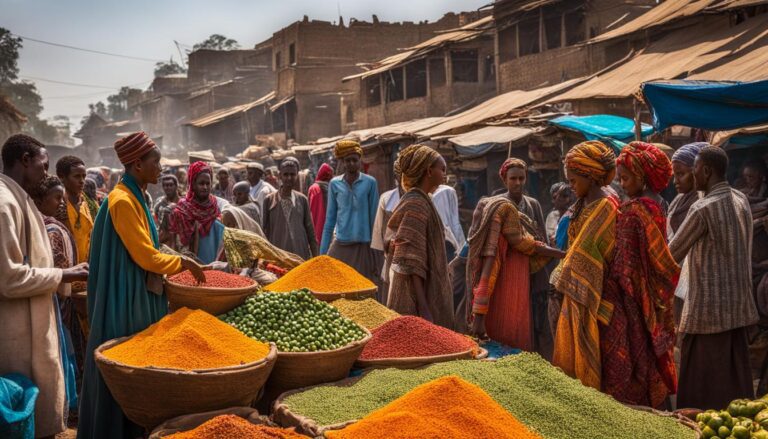What Is The Role Of Religion In Ethiopian Society?
The profound influence of Ethiopian Orthodox Christianity on societal norms and traditions
Ethiopian Orthodox Christianity holds a significant presence in the religious and cultural landscape of Ethiopia. It is one of the oldest Christian denominations globally, with a history dating back to the 4th century AD. The majority of Ethiopians, around 43-45% of the population, adhere to this faith, emphasizing its profound impact on societal norms and traditions.
The Ethiopian Orthodox Tewahedo Church plays a pivotal role in shaping the moral fabric of Ethiopian society. Its teachings and doctrines permeate various aspects of daily life, influencing ethics, values, and behaviors. The Church’s emphasis on compassion, charity, and communal harmony has fostered a strong sense of solidarity among Ethiopians and contributed to the country’s social cohesion.
Moreover, Ethiopian Orthodox Christianity has intertwined with Ethiopian culture, giving rise to unique traditions and practices. Religious festivals such as Timkat (Epiphany) and Meskel (Finding of the True Cross) are celebrated with great fervor and mark important milestones in the Ethiopian calendar. These events not only hold religious significance but also serve as occasions for social gatherings, strengthening community bonds.
In addition to shaping individual morality and cultural practices, the Ethiopian Orthodox Church has historically influenced political dynamics in the country. Throughout history, Ethiopian emperors and leaders have sought legitimacy and divine sanction from the Church, intertwining religion and politics in governance. This close relationship between the Church and the state has endured for centuries, highlighting the deep-rooted influence of religion on the Ethiopian socio-political landscape.
Ethiopian Orthodox Christianity’s profound influence on societal norms and traditions underscores the integral role of religion in shaping Ethiopian identity and community life. Its teachings, values, and practices have woven a rich tapestry of faith and culture that continues to endure and evolve in contemporary Ethiopian society.
Ethiopian History: Interplay between Religion and Politics
Ethiopia, known for its rich religious tapestry, has a history where religion and politics are intricately intertwined. The influence of religion in Ethiopian society dates back centuries and has significantly shaped the country’s political landscape. One of the key aspects of this interplay is the historical dominance of the Ethiopian Orthodox Tewahedo Church, which has played a central role in the country’s governance and cultural identity.
The Ethiopian Orthodox Church, an ancient Christian sect, has been a pillar of Ethiopian society, influencing societal norms, traditions, and even the legal system. From the Aksumite Empire to the present day, the church has been deeply involved in the political affairs of the nation. Monarchs were traditionally seen as God’s representatives on earth, with the church legitimizing their rule through elaborate ceremonies and rituals.
Throughout Ethiopian history, religious leaders have often wielded significant political power, sometimes acting as advisors to rulers or even assuming leadership roles themselves. This close relationship between religion and politics has led to periods of both stability and conflict within the country. For example, during the Zagwe dynasty and later the Solomonic dynasty, the church played a crucial role in legitimizing rulers and maintaining social order.
However, this relationship has not been without its challenges. At times, tensions have arisen between the church and the ruling elite, leading to power struggles and even schisms within the religious community. The medieval period saw power struggles between the church and the state, with attempts by rulers to exert control over the church and its vast landholdings.
In more recent history, particularly during the Marxist Derg regime in the 20th century, the Ethiopian Orthodox Church faced persecution and restrictions on its activities. The government’s efforts to secularize the state and reduce the church’s influence led to a period of significant upheaval for the religious institution.
Despite these challenges, religion continues to play a central role in Ethiopian society, with the government officially recognizing Christianity and Islam as the dominant faiths in the country. The Ethiopian constitution guarantees freedom of religion, and followers of different faiths coexist peacefully, contributing to the multicultural fabric of Ethiopian society.
The interplay between religion and politics has been a defining feature of Ethiopian history, shaping the country’s cultural identity and governance structures. While the relationship has faced challenges over the centuries, religion remains a powerful force in Ethiopian society, continuing to influence its traditions, beliefs, and societal norms.
The Role of Religion in Ethiopian Society: A Multicultural Perspective
Religion plays a pivotal role in Ethiopian society, shaping its rich and diverse cultural landscape. While Ethiopian Orthodox Christianity stands as the predominant faith, Islam, Judaism, and traditional indigenous beliefs also contribute significantly to the country’s religious tapestry. These various faiths have coexisted for centuries, influencing societal norms, traditions, and the daily lives of Ethiopians.
Islam in Ethiopia has a long history, with a sizable Muslim population contributing to the country’s multicultural identity. In regions such as Harar and parts of the eastern lowlands, Islam has played a significant role in shaping local customs and traditions. Mosques stand as important community centers, fostering a sense of identity and belonging among Ethiopian Muslims.
Similarly, Judaism has deep historical roots in Ethiopia, particularly among the Beta Israel community. Although many members of this community have emigrated to Israel in recent decades, their cultural and religious practices continue to influence Ethiopian society. Traditional Jewish holidays and rituals are observed, preserving an important aspect of the country’s religious heritage.
In addition to Christianity, Islam, and Judaism, Ethiopia is also home to various indigenous belief systems. These traditional faiths are often practiced alongside organized religions, contributing to the country’s multicultural ethos. Ceremonies, such as the Irreecha festival celebrated by the Oromo people, highlight the deep connection between religion, tradition, and social cohesion in Ethiopian society.
Religious festivals and ceremonies hold immense significance in Ethiopian culture, serving as occasions for communities to come together in celebration and worship. The Ethiopian Orthodox Church, with its elaborate rituals and ceremonies, plays a central role in the lives of many Ethiopians. Timkat, the celebration of Epiphany, and Meskel, the finding of the True Cross, are among the most widely observed religious festivals in the country.
Despite its rich religious heritage, Ethiopia faces modern challenges related to the role of religion in society. Debates surrounding religious freedom, interfaith relations, and the separation of church and state are ongoing. In a rapidly changing world, Ethiopians grapple with balancing traditional beliefs with the demands of a contemporary, multicultural society.
Religion is deeply intertwined with the fabric of Ethiopian society, influencing its cultural practices, social norms, and historical development. The coexistence of Christianity, Islam, Judaism, and indigenous faiths reflects the country’s diverse heritage and the importance of religious pluralism in shaping its identity. As Ethiopia navigates the complexities of the modern world, the role of religion remains a defining aspect of its societal landscape.
The Impact of Religious Festivals and Ceremonies on Social Cohesion and Identity
Religious festivals and ceremonies play a vital role in Ethiopian society, contributing significantly to social cohesion and the shaping of individual and communal identities. Ethiopia, known for its rich tapestry of religious diversity, celebrates a multitude of religious festivals and ceremonies throughout the year, each carrying deep historical and cultural significance.
One of the most prominent festivals in Ethiopia is Timkat, the celebration of Epiphany in the Ethiopian Orthodox Tewahedo Church. This festival brings communities together to commemorate the baptism of Jesus in the Jordan River and is marked by colorful processions, ritualistic ceremonies, and elaborate feasting. Timkat not only strengthens the bonds within the Christian community but also fosters unity and solidarity among Ethiopians of all backgrounds.
Similarly, the Muslim holiday of Eid-al-Fitr, marking the end of Ramadan, is another significant event that promotes social cohesion in Ethiopian society. Muslims across the country come together to pray, share meals, and exchange gifts during this joyous occasion, strengthening the sense of belonging and togetherness among the followers of Islam.
Moreover, religious ceremonies such as weddings, funerals, and initiation rites serve as important milestones in the lives of Ethiopians, reinforcing cultural values and beliefs that are deeply rooted in religious teachings. These ceremonies not only provide individuals with a sense of identity and belonging but also serve as occasions for the community to come together and support one another in times of joy and sorrow.
The impact of religious festivals and ceremonies goes beyond mere celebrations; they are intrinsic components of Ethiopian cultural heritage that have endured for centuries, shaping the collective memory and identity of the nation. Through these rituals, Ethiopians reaffirm their ties to their religious beliefs, ancestral traditions, and shared values, perpetuating a sense of continuity and connectedness across generations.
Religious festivals and ceremonies serve as pillars of social cohesion and identity in Ethiopian society, fostering interfaith harmony, cultural diversity, and a strong sense of community among its people. As Ethiopia continues to navigate modern challenges and changes, the enduring presence of these religious traditions provides a source of strength and unity for its diverse population.
The Role of Religion in Shaping Modern Ethiopian Society
Religion has always played a pivotal role in Ethiopian society, influencing various aspects of life, including politics, culture, and social norms. The country’s rich tapestry of religious diversity, with a dominant presence of Ethiopian Orthodox Christianity, has significantly shaped the nation’s identity over centuries. However, in modern times, the role of religion in Ethiopian society has sparked intense debates and posed challenges as the country grapples with socio-political changes and globalization.
One of the key contemporary challenges regarding the role of religion in Ethiopian society is the tension between traditional beliefs and modern ideologies. As the country undergoes rapid urbanization and integration into the global economy, younger generations are increasingly exposed to new ideas and lifestyles that may conflict with conservative religious teachings. This dynamic has created a generational divide, with traditionalists advocating for the preservation of religious values, while the youth push for more progressive and inclusive interpretations of faith.
Moreover, the interplay between religion and politics remains a contentious issue in Ethiopia. Historically, religious institutions, particularly the Ethiopian Orthodox Church, have wielded significant influence in political affairs. However, in the modern era, there are growing calls for the separation of church and state to ensure a more secular governance structure that respects the rights of all religious communities equally. This transition poses challenges as it requires balancing respect for religious traditions with the need for a more pluralistic and democratic society.
Despite these challenges, religious festivals and ceremonies continue to serve as essential markers of social cohesion and identity in Ethiopian society. Events such as Timket (Epiphany), Meskel (Finding of the True Cross), and Genna (Christmas) not only hold religious significance but also provide opportunities for communities to come together, celebrate their heritage, and strengthen bonds of solidarity. These festivals showcase the vibrancy of Ethiopia’s religious landscape and highlight the enduring importance of faith in fostering unity among diverse ethnic and religious groups.
The role of religion in shaping modern Ethiopian society is complex and multifaceted. While traditional beliefs continue to anchor many aspects of life, the country faces ongoing debates about the compatibility of religious teachings with evolving social norms and political structures. Navigating these challenges requires a delicate balance between honoring the country’s religious heritage and embracing the need for progress and inclusivity in a rapidly changing world. As Ethiopia continues its journey of development and transformation, the role of religion will undoubtedly remain a central theme in the nation’s ongoing narrative.
Conclusion
As we delve into the multifaceted landscape of religion in Ethiopian society, it becomes evident that the interplay between faith and societal structure has been a cornerstone of Ethiopian culture for centuries. The deep-rooted influence of Ethiopian Orthodox Christianity on norms and traditions has not only shaped the moral compass of the nation but has also instilled a sense of collective identity among its people. The rich tapestry of religious diversity, including Islam, Judaism, and other faiths, further underscores the multicultural essence of Ethiopian society, fostering harmony and mutual respect among different religious communities.
Throughout the history of Ethiopia, religion and politics have been deeply intertwined, with various rulers leveraging religious institutions to legitimize their authority and consolidate power. The Aksumite Kingdom’s adoption of Christianity as a state religion set a precedent for the intimate relationship between faith and governance in Ethiopian history. This dynamic has continued to evolve over the centuries, with religious leaders wielding influence in political affairs and shaping the trajectory of the nation.
Religious festivals and ceremonies play a pivotal role in fostering social cohesion and preserving cultural heritage in Ethiopian society. Events such as Timkat, the celebration of Epiphany, bring communities together in joyful commemoration, reinforcing bonds of kinship and shared beliefs. These rituals not only serve as occasions for spiritual reflection but also serve as platforms for expressing collective identity and values that transcend religious boundaries.
As Ethiopia navigates the complexities of modernity, the role of religion in shaping contemporary society has become a subject of debate and introspection. While traditional beliefs continue to hold sway in many aspects of daily life, the influence of globalization and secular ideologies has prompted a reevaluation of the place of religion in public discourse. From issues of gender equality to questions of religious tolerance, Ethiopians are engaging in critical conversations about how faith intersects with the evolving dynamics of the modern world.
The role of religion in Ethiopian society is a multifaceted and dynamic phenomenon that intertwines spiritual beliefs with cultural practices, political structures, and social cohesion. The enduring legacy of Ethiopian Orthodox Christianity, the intricate dance between religion and politics, the vibrant tapestry of religious diversity, the significance of religious festivals, and the contemporary debates surrounding faith all contribute to the rich tapestry of Ethiopian identity. In embracing this complexity, Ethiopians continue to navigate the evolving landscape of religious expression while honoring the traditions that have shaped their collective heritage.





